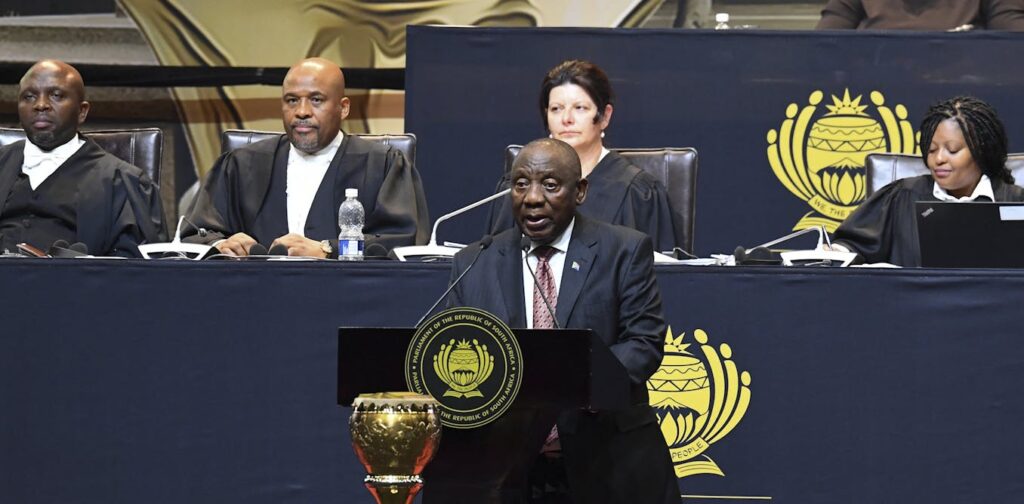South Africa’s Political Landscape Shifts to Unity Government Post-2024 Election
By [Author’s Name]
In a historical move echoing prominent power-sharing arrangements across Africa and other nations, South Africa has adopted a unity government following the 2024 general election, a contest characterized by an absence of an outright majority winner.
Unity governments, formed on the premise of fostering stability through collaboration, have long been recognized as practical solutions to mitigate political conflict and instability. In deeply divided societies, the cooperation of political elites is often viewed as essential for achieving national stability.
This recent development in South Africa is not an isolated phenomenon. The country’s socio-political landscape still grapples with the residual effects of its divisive past, prominently reflected in the continued racialized poverty and inequality. Achieving a semblance of political stability is viewed as crucial for advancing policy innovations in pivotal sectors such as education, healthcare, and the economy.
In light of the African National Congress (ANC) failing to secure a majority, securing 40% of the votes in May 2024 – a higher share than any other party – an unprecedented coalition government was the outcome. This coalition includes the Democratic Alliance, previously the official opposition, along with the Inkatha Freedom Party, the Patriotic Alliance, Good, and the Pan Africanist Congress of Azania.
Upon the convening of South Africa’s seventh parliament, critical positions including the President, Speaker, and Deputy Speaker were elected. The ANC retained the presidency with Cyril Ramaphosa, and Thoko Didiza continued as Speaker. The role of Deputy Speaker was awarded to the Democratic Alliance’s Annelie Lotriet.
Historical Context and Challenges
Historically, unity governments have often faced scrutiny regarding their sustainability, with political culture being a significant determinant. Elite political culture – the constellation of values, beliefs, and attitudes among political elites – has a profound effect on the behavior within political institutions. The behavior and values of these elites influence policy, institutional culture, and legitimacy. Therefore, an innovative approach centered on stability and accountability is crucial, yet inherently challenging.
The chasm between elite conduct and public expectations has previously eroded trust in socio-political institutions, notably during the Nkandla scandal under former President Jacob Zuma. This incident underscored the perils of disconnection between duty and public service within political institutions.
The Path Forward
The formation of South Africa’s seventh parliament demonstrates an elite-driven pact. The public, however, remains largely uninformed of the intricate terms of the negotiated arrangement. For power-sharing to be effective, it necessitates mutual accommodation at all levels of governance. Political parties must extend the spirit of collaboration and compromise from the leadership echelons to provincial, local, and ward levels, fostering an environment where strategic ideological compromises can coexist with public accountability.
The intersection of clientelism and patronage, particularly at lower political and administrative levels, poses another significant challenge. Parliament’s historical complacency during the era of state capture highlighted the disjunction between elite interests and public welfare, exacerbating governance deficiencies and public disenfranchisement.
Critical to the management of a unity government is the oversight role of parliament. Chief Justice Raymond Zondo’s insights, derived from his tenure as the chairman of the commission investigating state capture, underscores the necessity for robust parliamentary scrutiny to prevent a recurrence of extensive corruption.
Moving Forward with Caution
For South Africa’s renewed coalition to succeed, political leaders must navigate intra-party and inter-party dynamics astutely, ensuring coherent advancement towards collective goals. Effective management of power dynamics and political concessions is paramount to forestall political instability – a cautionary lesson drawn from previous local government power-sharing experiences.
In conclusion, the reevaluation of entrenched political habits and behaviors is imperative, especially for parties prone to fostering polarization. Successfully fostering a collaborative atmosphere is essential for the progress and stability of South Africa’s political future.
Source: Analysis by a South African political scientist and expert on the nation’s socio-political dynamics
[End of Article]
